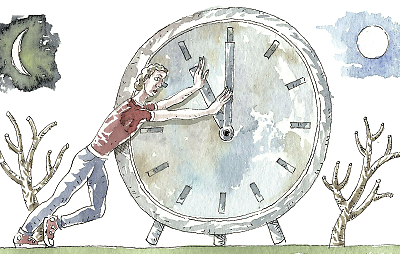Puberty Prompts Later Bedtimes and Wake Times
Abstract
Extensive data document the sleep changes that coincide with the onset of adolescence.
A longitudinal study documents pubertal changes in timing of sleep, suggesting early middle and high school start times may suppress a biologically driven need to sleep later.

A team led by Stephanie Crowley, Ph.D., at the E.P. Bradley Hospital sleep research laboratory and Department of Psychiatry and Human Behavior at the Warren Alpert Medical School of Brown University followed 94 adolescents in two cohorts: 38 children, first assessed at age 9 to 10, and 56 teens, enrolled at age 15 to 16.
Crowley, now an assistant professor of behavioral sciences at Rush Medical College, and colleagues reported their findings in PLOS ONE in November 2014. The study was supported by NIH.
The researchers determined the adolescents’ pubertal status at baseline and then assessed participants roughly every six months for the next two and a half years, always while school was in session. Participants wore a wrist activity monitor at home and kept a daily diary for at least one week before each assessment, recording when they went to sleep and got up. They also called the laboratory’s time-stamped answering machine just before they went to bed and on arising each morning.
Participants then spent an evening in the laboratory, where researchers collected saliva samples every 30 minutes under dim light, starting five hours before their usual bedtime and ending 30 minutes after that time. Using the samples, researchers determined when melatonin secretion started, an indicator of circadian timing. A physician assessed participants’ pubertal status at each visit.
As participants got older, melatonin onset time moved later. They went to sleep later on both weekdays and weekends and got up later on weekends. Starting around age 11, after entering middle school, participants began to get up earlier on weekdays, always before 7 a.m. Around age 18, after completing high school, they started sleeping about 90 minutes later on weekdays than they did when in school.
Participants aged 11 and older averaged less than eight hours of sleep on weekdays. The 16- and 17-year-olds slept less than seven hours on average on weekdays, while those aged 18 and older averaged seven and a half hours of sleep on weekdays. ■
“A Longitudinal Assessment of Sleep Timing, Circadian Phase, and Phase Angle of Entrainment Across Human Adolescence” can be accessed here.



